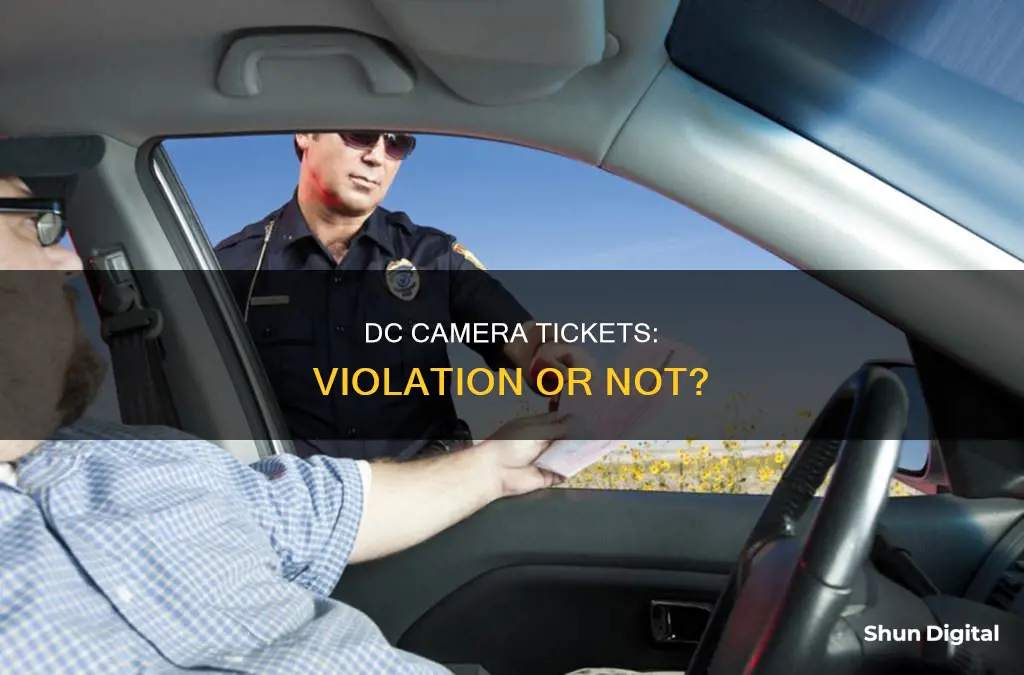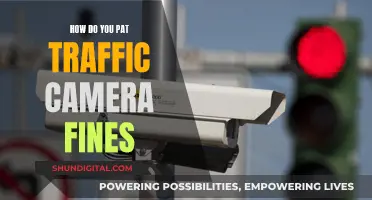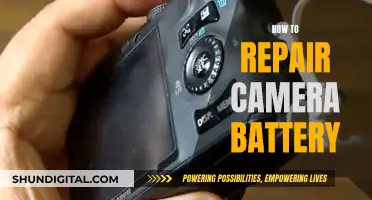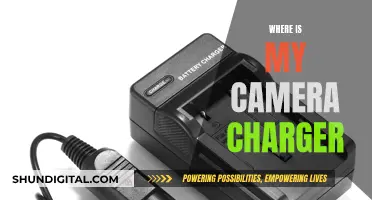
In Washington, DC, a ticket from an automated traffic camera system is classified as a moving violation. This means that, unlike in Prince George's County and Montgomery County, where speed camera tickets are considered civil violations, in DC, they are treated as regular traffic violations. While a camera ticket in DC will not result in points on your license or license suspension, it is still considered a moving violation and must be paid or contested within a certain timeframe.
What You'll Learn

A DC camera ticket is a moving violation
While a DC camera ticket is a moving violation, it does not carry the same consequences as a typical moving violation. Notably, drivers will not receive points on their license, nor will their license be suspended for failure to pay the fine. However, the fine must still be paid to avoid further penalties, such as the vehicle being booted or towed if parked in DC.
The District's automated photo enforcement program is designed to reduce traffic violations and improve public safety by enforcing traffic laws and reducing violations. The cameras capture and record violations, including relevant data, images, and video, which are then analyzed to determine if there were any extenuating circumstances. A citation is then mailed to the registered owner of the vehicle.
The fines for traffic violations captured by automated photo enforcement are the same as those issued by a police officer. Warning tickets are typically issued during an initial 30-day period of public education for new camera locations, after which actual Notice of Infractions (NOIs) are issued. It is important to note that there is no legal requirement for a warning period, and all motorists should obey traffic signs and regulations.
DNG and ARW: Adobe's Camera Raw Compatibility Mystery
You may want to see also

No points on your license
In Washington, DC, a ticket from an automated traffic camera is classified as a moving violation. However, it is important to note that these tickets do not carry any points on your driver's license and your license will not be suspended if you fail to pay the fine.
The District of Columbia utilizes a point system for moving violations to warn drivers who are at risk of having their licenses suspended or revoked. This system is designed to encourage drivers to be mindful of their records and how points can impact their driving privileges. While a ticket from an automated traffic camera is considered a moving violation, it will not result in any points being added to your license.
It is worth mentioning that the rules regarding speed camera tickets differ in nearby areas. For instance, in Prince George's County and Montgomery County, speed camera tickets are classified as civil violations, similar to parking tickets, and therefore do not result in any points on your license.
If you wish to contest a ticket from an automated traffic camera in Washington, DC, you have several options. You can choose to contest the ticket online, by mail, or by attending a walk-in hearing within 60 calendar days of receiving the ticket. It is important to note that once a ticket is paid, you can no longer contest it. Additionally, if you do not pay the fine or contest the ticket within 30 calendar days, a penalty equal to the fine will be added, and you may lose the opportunity to request a hearing.
Downsizing Raw Camera Files: Techniques for Efficient Storage
You may want to see also

No license suspension for non-payment
In Washington, D.C., a ticket from an automated traffic camera is classified as a moving violation. However, you won't have your license suspended if you don't pay up, and you won't get any points on your license. Camera tickets are processed like parking tickets and won't appear on your state driving record.
If you want to contest a ticket, you must not pay the fine and/or penalty. You can contest a ticket online, by mail, or by appearing at a walk-in hearing within 60 calendar days of the ticket issue date. Tickets must be paid or contested within 30 calendar days of receiving the ticket, or a penalty equal to the fine will be added, and you may lose the opportunity to have a hearing. If the ticket is more than 60 days old, a Motion to Vacate Judgment must be submitted within 120 calendar days from the date the ticket was issued to determine whether the ticket can still be contested.
If you were not driving the vehicle when the alleged violation occurred, you can file a Declaration of Non-Responsibility online. This is a sworn statement under penalty of perjury that the vehicle was not in your care, custody, or control at the time of the violation.
Red Light Camera Tickets: Who Pays the Price?
You may want to see also

Contesting a ticket
In Washington, DC, camera-issued tickets are classified as moving violations. This means that, unlike in Montgomery and Prince George's County, you will get points on your license. However, your license will not be suspended if you don't pay up.
If you believe a ticket was issued unfairly, you can contest it. You can do this online, by mail, or in person within 60 calendar days. If you contest the ticket between 31 and 60 calendar days after it is issued, or mailed, you are liable for both the fine and penalty. If the ticket is more than 60 days old, you may file a Motion to Vacate to determine whether the ticket can still be contested. This must be received within 120 calendar days from the date the ticket was issued.
To contest a ticket, you must provide all the information and documentation that supports your reasons for contesting. This includes a written explanation of your situation and any evidence you have to support your claims, such as photos or receipts. If you are the registered owner of the vehicle, you must present the vehicle registration. If not, the owner must authorize someone to act on their behalf by completing and signing a power of attorney form.
If you are contesting a ticket issued to a rental car, you must provide the rental agreement for the vehicle, showing the rental period matching the date of issuance for the ticket.
If you are contesting a parking ticket, there are certain legal defenses you can use. These include:
- You were not the owner or lessee of the cited vehicle at the time of the infraction.
- The cited vehicle or its state registration plates were stolen at the time of the violation.
- The relevant signs prohibiting or restricting parking were missing or obscured.
- The relevant parking meter was inoperable or malfunctioned through no fault of the person who received the ticket.
- The facts alleged on the parking violation notice are inconsistent or do not support a finding that the specified regulation was violated.
- The vehicle was suddenly mechanically disabled and was removed as soon as possible.
- The operator of the vehicle suddenly needed immediate medical assistance (proof of medical attention is required).
Charging the Blackmagic Pocket Cinema Camera 4K: A Guide
You may want to see also

Paying a ticket
In Washington, DC, a ticket from an automated traffic camera is classified as a moving violation. This means that it is considered a civil violation, like a parking ticket, and will not result in points on your license or a license suspension if you don't pay it. However, paying a ticket from a traffic camera in DC is similar to paying a parking ticket.
If you want to pay a parking ticket in DC, you can do so online, by mail, or in person. The process is straightforward:
- Online: Visit the DC DMV website and follow the instructions to pay your ticket using your credit or debit card.
- By Mail: Send a cashier's check or money order, made out to the DC DMV, along with the ticket number and your vehicle information, to the address provided on the DC DMV website.
- In Person: Go to a DC DMV location with your ticket and vehicle information, and pay using cash, credit, or debit card.
It's important to pay your ticket within the specified time frame to avoid additional penalties and late fees. The DC DMV website will provide information on the deadline for payment and any applicable grace periods.
Additionally, if you intend to contest the ticket, do not pay it. Once the fine is paid, you can no longer contest the ticket or request a refund. Instead, gather your evidence and submit it along with your statement and defence to the DC DMV for review.
The Evolution of Nord Cameras: A Historical Perspective
You may want to see also
Frequently asked questions
Yes, a ticket from an automated traffic camera system in the District of Columbia is classified as a moving violation.
A civil violation is similar to a parking ticket and does not result in points on your license. A moving violation results in points on your license.
If you don't pay a DC camera ticket, your car may be booted or towed. Additionally, your ticket will be sent to a collection agency.
Yes, you can contest a DC camera ticket online, by mail, or by appearing at a walk-in hearing within 60 calendar days of the ticket issue date.
If you contest a DC camera ticket, a hearing examiner will review your statement, defense, and evidence. They will then decide whether to uphold the ticket, reduce the fine, or dismiss the ticket based on DC Code and traffic regulations.







